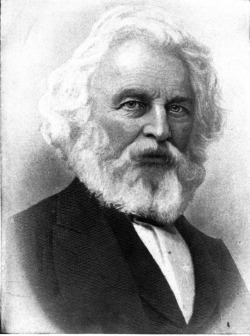Mixed Metaphors
the mingling of one metaphor with another immediately following with which the first is incongruous. Lloyd George is reported to have said, “I smell a rat. I see it floating in the air. I shall nip it in the bud.”
The Day is Done
Henry Wadsworth Longfellow
The day is done, and the darkness
Falls from the wings of Night,
As a feather is wafted downward
From an eagle in his flight.
I see the lights of the village
Gleam through the rain and the mist,
And a feeling of sadness comes o’er me
That my soul cannot resist:
A feeling of sadness and longing,
That is not akin to pain,
And resembles sorrow only
As the mist resembles the rain.
Come, read to me some poem,
Some simple and heartfelt lay,
That shall soothe this restless feeling,
And banish the thoughts of day.
Not from the grand old masters,
Not from the bards sublime,
Whose distant footsteps echo
Through the corridors of Time,
For, like strains of martial music,
Their mighty thoughts suggest
Life’s endless toil and endeavor;
And tonight I long for rest.
Read from some humbler poet,
Whose songs gushed from his heart,
As showers from the clouds of summer,
Or tears from the eyelids start;
Who, through long days of labor,
And nights devoid of ease,
Still heard in his soul the music
Of wonderful melodies.
Such songs have a power to quiet
The restless pulse of care,
And comes like the benediction
That follows after prayer.
Then read from the treasured volume
The poem of thy choice,
And lend to the rhyme of the poet
The beauty of thy voice.
And the night shall be filled with music,
And the cares, that infest the day,
Shall fold their tents, like the Arabs,
And as silently steal away.
Henry Wadsworth Longfellow uses mixed metaphors throughout his poem “The Day Is Done”. One example of a mixed metaphor used in this poem is “Whose distant footsteps echo through the corridors of time”. Wadsworth is writing about life and death, and when “the day is done” (your life is over) all you “want to do is rest”. With this mixed metaphor Wadsworth is discussing how life continues without stopping, and there is no possible way to stop it.

"As to the pure mind all things are pure, so to the poetic mind all things are poetical." ~Henry Wadsworth Longfellow
Henry Wadsworth Longfellow

Henry Wadsworth-Longfellow was a powerful figure in the cultural life of nineteenth century America. Born in 1807, he had become a national literary figure by the 1850s and a world-famous personality by the time of his death in 1882
Henry's grandfather, Peleg Wadsworth (1748-1829), was a Revolutionary War general who later served seven terms in the United States Congress. The family home in Portland was built for Peleg in 1785-6.
Father Stephen Longfellow (1776-1849) was a lawyer and legislator who helped found many of Maine's early cultural institutions, including the Maine Historical Society (1822). Henry's mother and early encourager was Zilpah Wadsworth Longfellow (1778-1851), direct descendant of Plymouth's John and Priscilla Alden, and a woman of learning, wit, and liberal religious convictions.
Longfellow attended Bowdoin College, in Brunswick, Maine, where he met Nathaniel Hawthorne, his lifelong friend and literary colleague. After graduation in 1825 and three years of touring and study in Europe, he assumed the professorship of modern languages — then a relatively new field — at Bowdoin.
His publishing record (six foreign language textbooks in as many years) finally earned him a similar post at Harvard in 1834, beginning his long association with the city of Cambridge.
Longfellow was a devoted husband and father with a keen feeling for the pleasures of home. But his marriages ended in sadness and tragedy — the first to Mary Potter, of Portland, who died in 1835; the second to Fanny Appleton — the great love of his life and the mother of his six children — who died of burns from a terrible accident in 1861.
(http://www.poemhunter.com/henry-wadsworth-longfellow/biography/)
